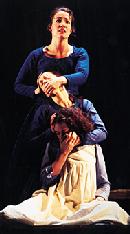SEARCH CurtainUp
On TKTS
LETTERS TO EDITOR
REVIEWS
FEATURES
ADDRESS BOOKS
Broadway
Off-Broadway
DC
NEWS (Etcetera)
BOOKS and CDs
(with Amazon search)
OTHER PLACES
Berkshires
DC (Washington)
London
Los Angeles
QUOTES
FILM
LINKS
MISCELLANEOUS
Free Updates
Masthead
Type too small?
NYC Weather
A CurtainUp London  Review
Review
The Mill on the Floss
By Lizzie Loveridge
First Call Ticketing
|
|
| An over-cute woman woman's no better nor (sic) a long tailed sheep - she'll fetch none the bigger price for that.
-- Mr Tulliver |
 Jessica Lloyd Caroline Faber all as Maggie Tulliver (Photo: Mark Douet) |
Shared Experience are the expressionistic theatrical interpreters of great novels "par excellance". They are a theatre company run by women and they often choose to stage plays which highlight feminist issues. Helen Edmundson has re-worked the company's 1994 award winning production of The Mill on the Floss which will go to the John F. Kennedy Centre in Washington and China after its London run. . The Mill on the Floss is staged with three actors playing Maggie Tulliver, one for each development period of her life, as a wild child, as a follower of asceticism and as a mature woman. It is a device which was also used with great success in their adaptation of Jane Eyre.
It is a highly exciting and involving production with both Nancy Meckler and Polly Teale directing. The opening scene stages the drowning of a witch by suspending Molly below a platform and lighting beneath in green as though she is in the water. It is as atmospheric as you will find. This scene is recreated at the end of the play as St Oggs is inundated by water. The theme is that Maggie has been drowned as a witch, a final persecution for her unconventionality. This staging plays down Maggie's reconciliation with her brother as they drown together but it is one interpretation of George Eliot's third novel, which mirrors some of her own experiences. (Eliot had a brother who refused to see her after she lived with George Lewes who was married to a woman who kept presenting him with babies fathered by another, from whom he could not get a divorce).
The story is of brother and sister Tom (Hywel Morgan) and Maggie Tulliver (Pauline Turner), who live with their parents in a fictional St Oggs, a rural, low lying community, often thought to be Lincolnshire. While Tom goes to school at ruinous expense to his father (Pip Donaghy), Maggie is not given an education although she is intelligent and free thinking. Maggie is born before her time, unable to conform to society's image of women. The story traces the Tulliver family through ruin, losing the ownership of the mill and rebuilding. Maggie, as a young woman (Jessica Lloyd) discovers Thomas a Kempis, an ascetic philosopher and writer and she learns principles of self denial. Through her friendship with the intelligent, considerate Philip Wakem (Michael Matus), who is a hunchback, Maggie gives up asceticism. She is wooed by her cousin Lucy's (Hilary Maclean) fiancé, Stephen Guest (Joseph Millson). Maggie (Caroline Faber) goes on a boat trip with Stephen, is compromised when she cannot get home and he proposes an elopement. Initially she agrees, but gives him up out of family loyalty to Lucy. Stephen goes abroad and Maggie returns to St Oggs where she is a social outcast. Tom refuses to have any contact with his disgraced sister. In a final scene when the river is flooded, Maggie takes out a boat to try to save her brother but they are both drowned. Maggie is 19 when she dies having tried to save her brother when no one else would.
The cast of eight each takes on at least two parts. Pauline Turner is spellbinding and full of vitality as young Maggie with her long curly hair, as unruly as her gipsy character. It is this same hair which she cuts off in a passionate, impetuous gesture. Her line, "Am I to get an education?" was met with ironic laughter from the audience sympathetic to female emancipation. Jessica Lloyd's tight teenager learns self denial and finally flowers into Caroline Faber's rounded Maggie. I also liked Michael Matus's hunch backed Philip. Hywel Morgan is less agreeable as Tom with a tendency to priggishness. All the female cast muck in to cover the aunts, Mrs Tulliver's sisters, to give us a picture of these Victorian women and the society they represent.
The set is slightly lopsided with furniture originally askew, two of the four legs longer than the others a bit like Philip with his leg on a brick. However, nothing jars in this finely detailed production. As each Maggie takes over, the director has them link for easy understanding.There are beautiful tableaux of people on the platform suspended above the stage, still moments as well as those full of energy. The final storm and flood is highly dramatic. The direction of Maggie and Stephen's romantic boat trip as they dance a paso doble with his coat typifies Liz Ranken's skill with movement that adds another enhancement here as in previous Shared Experience productions.
| THE MILL ON THE FLOSS
Written by George Eliot in a new version by Helen Edmundson Directed by Nancy Meckler and Polly Teale With: Pip Donaghy, Caroline Faber, Jessica Lloyd, Hilary MacLean, Michael Matus, Joseph Millson, Hywel Morgan, Pauline Turner Design: Bunny Christie Lighting Design: Chris Davey Music: Peter Salem Company Movement: Liz Ranken Running time: Two hours 45 minutes with one interval Box Office: 020 7369 1791 Booking to 5th May 2001. At John F Kennedy Centre Washington DC May16th to June 10th 2001. Reviewed by Lizzie Loveridge based on 4th April 2001 performance at the New Ambassadors West Street London WC2 |




